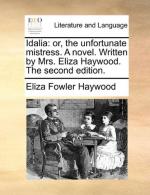|
This section contains 6,490 words (approx. 22 pages at 300 words per page) |

|
SOURCE: "Descending Angels," in Fetter'd of Free?: British Women Novelists, 1670-1815, edited by Mary Anne Schofield and Cecilia Macheski, Ohio University Press, 1986, pp. 186-200.
In the following essay, Schofield analyzes Haywood's depiction of prostitutes in her fiction.
In 1731 Sarah Millwood, London prostitute, protests:
I curse your barbarous sex, who robb'd me of [my virtues] e'er I knew their worth; then left me, too late, to count their value by their loss. Another and another Spoiler came, and all my gain was poverty and reproach.1
She expresses the feminine concern of the eighteenth century: the wholesale takeover of the female self by the male machine. But Sarah's plea is not a solitary one, nor was the whore a voiceless victim. Notables such as Jonathan Swift and Bernard Mandeville in Essay upon Projects (1707) and A Modest Defence of the Public Stews (1724) respectively had taken on the cause of the common...
|
This section contains 6,490 words (approx. 22 pages at 300 words per page) |

|


